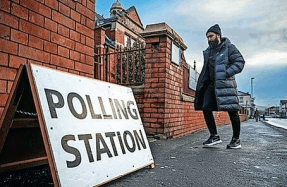FIRST AMONG EQUALS

IN THE EARLY HOURS OF 24 FEBRUARY, Olena Zelenska became aware of the sound of muffled booms somewhere in the distance. As she drifted towards wakefulness, she realised the sounds she was registering could not be fireworks. Her eyes snapped open; she discovered she was alone in the bed. She jumped up and hurried to the next room, where she found her husband, Ukrainian president Volodymyr Zelenskiy, already dressed for work in a suit and tie.
“What’s going on?” she asked him.
“It’s started,” he told her.
“I had the feeling I was inside a parallel reality, that I was dreaming,” Zelenska says, describing the moment when normal life was interrupted, for her family and her country. Soon afterwards, her husband left for the presidential compound in the centre of Kyiv, to chair a security council meeting that would decide on the initial response to Vladimir Putin’s shocking full-scale invasion of Ukraine. He told his wife she should wait for him to call later in the day with instructions.
Left alone, she went to check on the couple’s two children, nine-year-old Kyrylo and 17-year-old Oleksandra. They were already awake and dressed, and they seemed to understand what was happening. Zelenska began to throw together a suitcase of possessions, scurrying down to the basement with the children and their security detail every time the booms got too close. At one point, she was standing on the first floor of the presidential villa and looking out of the window when a fighter jet screamed by, loud and low. She wasn’t sure if it was Ukrainian or Russian.
“It was a surreal feeling … like I was playing a computer game and had to pass certain levels to find myself back at home. But I was also keeping it together, and I had this weird smile on my face all day, because I was trying not to show the children panic. We just followed the
You’re reading a preview, subscribe to read more.
Start your free 30 days



